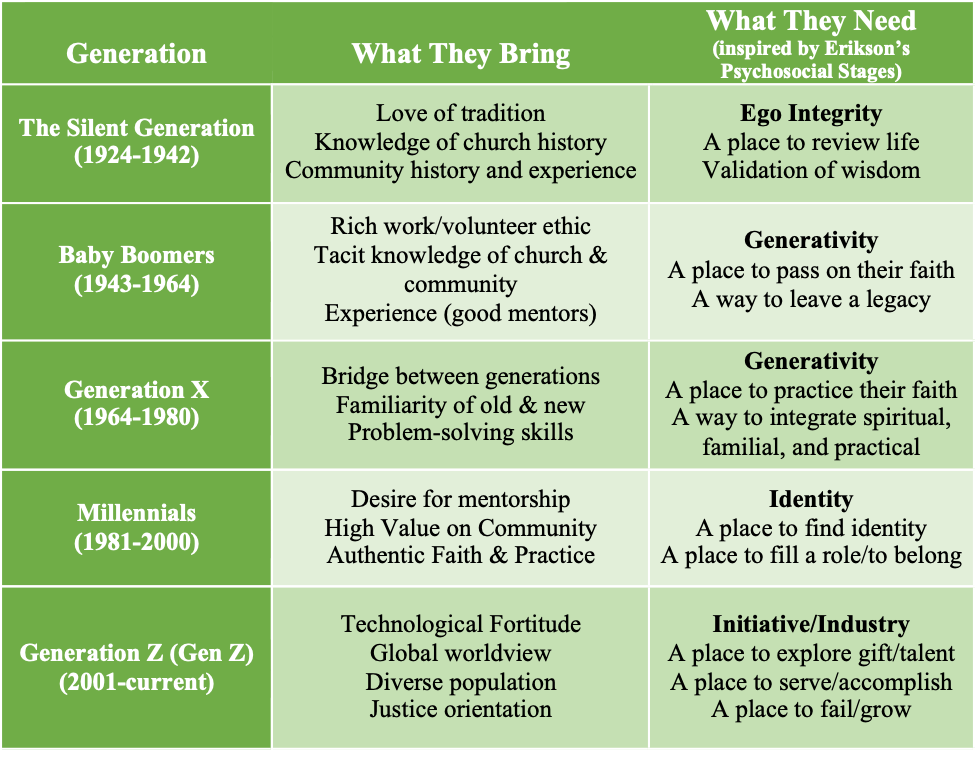For churches of all sizes, intergenerational ministry is a necessary and worthwhile undertaking.
First, a story: My oldest daughter recently (jokingly!) said to me, “Okay, boomer…” when I was doing an “old person” thing (taking a selfie the wrong way…who knew?). I gave her my sternest “mom” glare and said, “I’m not a boomer. I’m an X-er.” Her amused glance had a “Whatever…” feel. But it did lead her to ask, “Who came up with the generations anyway?”
Now that’s a great question! Where did the stereotypes for each generation originate? And how do these assumptions affect how churches do intergenerational ministry?
What Is Intergenerational Ministry?
Sometimes it’s easier to define something by exploring what it is not. Many people associate this term with children’s or family ministries. Although those programs may be partners in intergenerational ministry, their scope isn’t broad enough. Intergenerational ministry encompasses the whole church, all generations, in a communal and corporate context.
Intergenerational ministry is an intentional approach. It allows for and encourages interaction between multiple generations. Avenues include corporate worship, relational mentorship, and lifelong community.
For a church to recognize the need for generational connectivity, it must answer two key questions. What does each generation need from the church? And what can each generation contribute to the church?
Where did generational labels originate?
Generational theory, grouping individuals into social groups based on birth year and life experiences, gained steam in the mid- to late-20th century. Why? Marketing firms began exploring how to best market to specific groups. Nicknames helped create a collective conscious. In other words, companies wanted to sell us stuff.
Currently, the most likely generations found in a faith community are the Silent Generation (born 1924-1942), Baby Boomers (1943-1964), Generation X (1965-1980), Millennials (1981-2000), and Gen Z (2001-current). These groupings offer unique experiences in spiritual and communal practices for the church (see chart below).
- The older generations bring a wealth of faithful testimonies and historical worship practices. They also offer community-sustaining disciplines.
- The middle generations offer a bridge between past and current experience. They’re also up-to-date on the latest social media trends.
- The youngest generation offer the heartbeat of current culture. They apply spiritual truths in a dynamic cultural environment.
What does each generation tend to need?
Likewise, each generation brings its unique needs to the church. The chart below uses Erik Erikson’s theory of psychosocial stages to outline these needs in a church setting.
- The older generations need to be needed. They desire generativity and legacy-leaving. Being isolated from people to whom they can leave their legacy is stifling. That, in turn, leads to stagnation.
- The middle generations seek intimacy in deeper relationships. They desire mentorship and discipleship. If such opportunities are lacking, they’ll retreat into isolation.
- The youngest generations are looking for a place to be industrious (an important part of the community). Plus, they want to find identity (a role to play). So faith communities need to be intentional. That means providing safe, fun environments such as children’s church and youth group. Younger people also need opportunities to participate and serve.

Erikson’s stages derived from https://www.simplypsychology.org/Erik-Erikson.html
What does this mean for intergenerational ministry?
Church leaders, here’s the main point. Congregations comprise multiple generations with multiple gifts and needs. We usually can’t “program” ways to engage into the church experience. Instead, we must creatively find space to cultivate relationships and encourage meaningful communication.
A richness exists in connecting the generations. Let’s discover it together. Okay, boomer?
This article about intergenerational ministry originally appeared here.


